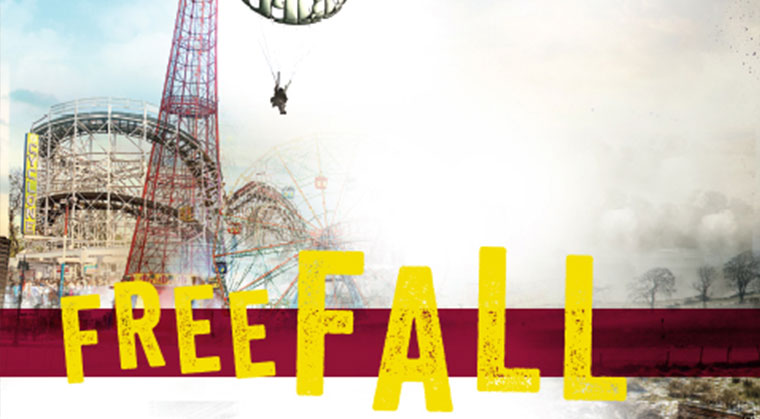Freefall: Chapter 11


“T
wenty-one bucks a month salary,” Moe said. “I figure that works out to about half a penny per step in drill.”
Harry’s laughter echoed off the wooden beams of the empty barracks. “Quit griping, Freed. After all, you’re teacher’s pet. Maybe the Army will give you another two bits for good behavior.”
Teacher’s pet. A few weeks before, he’d been Moishe Boruch Freed to his father, Moe to his classmates, and Moey to his sister. Now, he was simply Teacher’s Pet — like Harry the Jewboy, Laughin’ Lu, Captain Crazy, Flatfoot Freddie, and dozens of others.
Perhaps it was still another way of the military divesting its recruits of their individuality. Maybe it was an attempt to put a little humor into a humorless situation. Or, as Moe suspected, it might have been sheer spite on the part of their sergeants and drill instructors. Whatever the reason, within two weeks of starting basic training, almost everyone in their platoon had been given a nickname, most of them funny, many with an edge of nastiness or good, old-fashioned prejudice.
“Teacher’s Pet” Freed. Moe had to admit, with a surge of pride, that the nickname fit. He had Major William’s friendly and efficient assistance whenever he needed to deal with his religious requirements to thank for that. Not to mention Nolan’s Jew-baiting eye always upon him, daring him to mess up and take the consequences. Between William’s help and the desire to show up Nolan, Moe had — much to his own surprise — turned himself into a model soldier. His uniforms were the crispest, his salutes the fastest, his carbine the shiniest in his squad. When test results were posted, Freed’s name invariably topped the list. (No surprise there; it had been the same all through school.)
Harry carefully placed the chess pieces back into their small burlap sack. He glanced at his watch. “C’mon, Moe, we’ve got four hours left to the liberty. It’s crazy to stay on base.”
Moe stretched himself off the stool where he’d spent — could it be? — the last two hours in grim competition with his friend. “Nah, let’s just go for a walk.”
“I don’t understand you. We’ve been stuck on base two solid weeks. Next week is war games; it’s not going to be a picnic. What’s wrong with a quick stop in town?”
What was wrong with a stop in town?
Moe had never had a friend quite like Harry. Students in Moe’s public school sometimes bullied him and often cheated from him on tests, but play with him? Moe Freed was a Jew, with a beanie and a baldy haircut — a pariah, a social outcast. Even in his high school years in Torah Vodaath, where he had, blessedly, studied with boys who understood Shabbos and Torah law, he’d rarely enjoyed social contact. Coney Island was a long way off from Williamsburg, and Moe had no desire to bring friends to his home. Who else lived in a boarding house? He could imagine his schoolmates meeting the yenta ladies who would interrogate them about their family background — or his father, whose serious gaze and solemn demeanor would intimidate the hardiest of teenagers.
No, social life was not for him. Moe Freed had his studies — and his silence — as his sole companions.
And now, incredibly, he had Harry. A soldier, from a family of soldiers. A Jew, fascinated by Moe’s manner of living. It was Harry who now served as Moe’s trusted native guide through the forest of arcane Army lore and regulations, while Moe in turn led him through the pathways of Torah — starting with the alef-beis.
Harry spoke easily and freely about his life as an army brat, fascinating Moe with tales of moving from base to base as Harry’s father, now a major, slowly moved up the peacetime military ladder. But if Harry was an engaging speaker, he possessed, also, the rare gift of listening in a way that encouraged another to speak.
For the first time in his life, Moe had a friend to talk to.
And yet… and yet…
How could he explain to a young American man, even his friend, Harry, why the lures of a soldier’s liberty could not — should not — tempt a person who followed Torah law? Brawling, smoking, drinking, flirting: these were soldiers’ pastimes. These were for Luigi, Paul, Robert, John, maybe even Harry. But not for Moishe Boruch.
How could he explain a lifetime of values in a few sentences?
“I just don’t feel like it. C’mon, let’s get out of here.”
Harry stepped out with his friend into the Missouri evening. Moe, without noticing, walked in the quick-time pace — 120 steps a minute — that had been drilled into him these past weeks.
“Hey, soldier, slow it down,” Harry said with a laugh. “There’s no DI here watching you. How do you manage to keep the rhythm so perfectly? I don’t think even my father marches the way you do.”
Moe grinned. Here was one secret he could share with Harry.
“I count.”
“Huh?”
“I keep myself focused by counting in my head, two numbers — two steps — every second.”
“Count? You mean like, 1, 2, 3?”
“Not exactly. More like, One, two three. Eintz, tzvei, drei. Uno, dos, tres. Echad, shtayim, shalosh.”
Harry stopped short, as if he’d heard a ghostly military voice bellowing the command, Halt!
“What are you talking about, Moe?”
A moment’s hesitation. Funny, how hard it was to speak about himself, even something innocuous, even to a friend like Harry.
“You see, I like languages. I like learning new ones. So I… I study languages, whenever I have a chance.”
“You’re kidding, right?”
“No. No kidding.”
“Just for fun?”
“Yup. Just for fun.”
“How many languages do you speak?”
Moe looked up at the moonlit sky, silently counting. “Six. No, seven.”
“Would you mind telling me, Mr. Teacher’s Pet, what they are?”
Moe hesitated. Maybe he shouldn’t have told Harry about this admittedly peculiar hobby of his. Up until now, except for his sister, only a nameless clerk in the army who’d filled out some forms about him knew of his unusual facility with language.
He’d started the conversation, now he had no choice. “Well, of course there’s English. And Yiddish. And Hebrew. I’m good in Italian,” he continued. He’d started learning Italian as a way to survive on the streets; knowing what the kids were planning to do to him as they muttered in their Sicilian dialect helped him avoid them. “I can speak French, don’t read it so well. German, I picked up from some refugees in the boarding house — no big deal, if you speak Yiddish. I taught myself some Spanish. That’s seven, right? Oh, make that eight – Aramaic. Language of the Talmud.”
“You know, Freed, you crack me up. Eight languages. Wow.” Harry and Moe started walking again, this time at a slower pace. “You realize they’re going to offer you OCS, don’t you?”
“Officer Candidate School?”
“Yup. Moe, you’re smart. You’re the best drill man we have in the platoon. You’ve kept your nose clean, even with Nolan watching you. You are officer material, no questions asked. In three months you’ll come out of OCS, a 90-day-wonder, a Second Lieutenant who speaks every language on the planet. And you’ll be giving me orders.”
An officer? He tried on the thought, as if he were putting on a new and unfamiliar uniform.
Lieutenant Moses Freed?
They’d walked through the closely built rows of barracks, each building the same as the one next to it, and had now reached the perimeter of the base. In the glow of the spotlights they could make out the forms of three guards standing idly by the gate, smoking.
A thought suddenly struck Moe. “Harry, why did you wind up enlisting as a private? With your father’s background, shouldn’t you have been in West Point or ROTC or something?”
Harry’s reply was uncharacteristically curt. “Long story. Boils down to this: I wanted to do this myself. My way. Not my father’s way.” A pause. “I didn’t want to be my father’s shadow.”
From the guardhouse, one of the soldiers gave a yell in their direction. “Hey, you guys? You’re in Dog Company, right? What’cha doin’ hanging around here? Don’t you got leave?”
Moe stared at the gate. At the three soldiers standing, rifles draped casually on their shoulders. At his friend, Harry, looking longingly at the road outside Camp Crowder. At the road that led to a nearby town.
Harry’s words seemed to echo down from the deep and starry sky.
I wanted to do this myself… not my father’s way. I didn’t want to be my father’s shadow…
Private Moe Freed executed an about face that would have thrilled any drill instructor.
“Harry, let’s get out of here. Let’s go to town. You’re right — we’ve got four hours of freedom coming to us.”
***
She must have been mad.
That was it: temporary insanity. Insanity brought about by too much of her newly discovered aunt, too much Central Park West and cruise wear, too many thoughts of secrets and pumpkins and coaches.
Well, she was no Cinderella now. She was just plain Annie Freed. Going to meet a young man who might want her to be his wife. A young man who, from all accounts, was completely unsuitable.
She didn’t want to meet Abe Levine. She didn’t want to meet anyone. She wasn’t ready to get married.
Besides, she had nothing to wear.
For a millisecond, a montage of colors and fabrics flashed through her mind; she could almost see them, through the tears that were fighting to burst out of her eyes. Exquisite rose-colored blouses. Rachel Levine’s lovely green hat. Aunt Cele’s lacy black sleeves.
Enough! If she couldn’t meet Abe Levine in a fashionable outfit, at least she wouldn’t also have bloodshot eyes. She was Yeruchum Freed’s daughter, and she knew how to control her emotions. She would be composed, pleasant, dignified.
If only I had a prettier cardigan.
With a sigh she slipped on her best dark pleated skirt, a bright turquoise blouse, and a woolen sweater. Her friend Molly, in on the secret, had loaned her a strand of pearls.
There was a tap on the door and, much to her surprise, Mrs. Horn walked into the room.
“Chanaleh, your father has told me to keep everyone out of the dining room, and to prepare a special tray of cakes. I can guess why, and I came to give you these.” She handed Chanaleh a pair of soft tan doeskin gloves. “A lady is always known by her gloves, zeeskeit.”
Under this wholly unexpected barrage of love and caring, Annie’s defenses broke down; the tears came.
“Nu, nu, Mammaleh,” Mrs. Horn clasped her in arms that had grown strong kneading countless loaves of bread. She spoke as one would to a child needing comfort for a scraped knee. “It will be all right. You’ll find a nice boy, a good boy. Not good enough for you, of course.”
Annie laughed as she cried, took a breath, and assured Mrs. Horn she would be all right. She gave the cook one more grateful kiss, and left her to go wash her face and brush her hair one more time.
The doorbell rang.
It’s just one meeting, nothing more than that, she told herself, trying to still the rapid beating of her heart. And besides, she couldn’t help laughing, with doeskin gloves, I can survive almost anything.
She was still smiling when she walked down the stairs to meet Abe Levine.
To be continued…
(Originally featured in Family First, Issue 499)
Oops! We could not locate your form.








